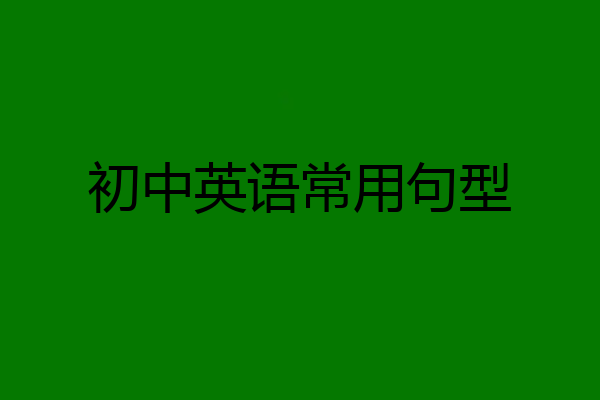
winnietang1
1简单句、并列句、复合句根据语法形式,即句子的结构,英语的句子可分为简单句、并列句和复合句。1简单句句型:主语+谓语只包含一个主谓结构,而句子的各个结构都只由单词或短语表示。简单句有五种基本句型,详见第十七章。They are playing baseball in the garden.他们正在公园里打棒球。Her brother and sister both are teachers.她的哥哥和姐姐都是老师。2并列句句型:简单句+并列连词+简单句(常见的并列连词有and,but,or)并列句是由两个或两个以上的简单句连接而成。并列句中的各简单句意义同等重要,相互之间没有从属关系,是平行并列的关系。它们之间用连词连结。My friend was at home, and we talked for along time.我的朋友在家,我们谈了好长时间。Her father is a doctor and her mother is a teacher.她父亲是个医生,她母亲是个老师。I liked the story very much but Li Ming wasn't interested in it.我非常喜欢这个故事,可是李明却对它不感兴趣。Hurry up,or you'll be late.快点,否则你就会迟到的。3 复合句句型:主句+连词+从句;或连词+从句+主句(包含一个主句、一个或一个以上的从句,或只包含一个从句,但有两个或两个以上的主句的句子叫复合句。)


太阳西边出
一、句型1: Subject (主语) + Verb (谓语)
这种句型中的动词大多是不及物动词,常见的动词如: work, sing, swim, fish, jump, arrive, come, die, disappear, cry, happen等。如:
1、Li Ming works very hard.李明学习很努力。
2、The little girl cried even harder. 小女孩哭得更厉害了。
3、The accident happened yesterday afternoon.事故是昨天下午发生的。
二、句型2:Subject (主语) + Link. V(系动词) + Predicate(表语)
这种句型主要用来表示主语的特点、身份等。其系动词一般可分为下列两类:
(1)表示状态。这样的词有:be, look, seem, smell, taste, sound, keep等。如:
1、 This kind of food tastes delicious.这种食物吃起来很可口。
2、He looked worried just now.刚才他看上去有些焦急。
(2)表示变化。这类系动词有:become, turn, get, grow, go等。如:
1、Spring comes. It is getting warmer and warmer.
春天到了,天气变得越来越暖和。
2、The tree has grown much taller than before.
这棵树比以前长得高多了。
三、句型3:Subject(主语) + Verb (谓语) + Object (宾语)
这种句型中的动词一般为及物动词。其宾语通常由名词、代词、动词不定式、动名词或从句等来充当。例:
1、He took his bag and left.(名词) 他拿着书包离开了。
2、 Li Lei always helps me when I have difficulties. (代词)
当我遇到困难时,李雷总能给我帮助。
3、 She plans to travel in the coming May Day.(不定式)
她打算在即将到来的“五一”外出旅游。
4、 I don’t know what I should do next. (从句)我不知道下一步该干什么。
四、句型4: Subject(主语)+Verb(谓语)+ Indirect object(间接宾语)+Direct object (直接宾语)
这种句型中,直接宾语为主要宾语,在句中不可或缺,常常由表示“物”的名词来充当;间接宾语也被称之为第二宾语,去掉之后,对整个句子的影响不大,多由指“人”的名词或代词承担。引导这类双宾语的常见动词有:
buy, pass, lend, give, tell, teach, show, bring, send等。如:
1、Her father bought her a dictionary as a birthday present.
她爸爸给她买了一本词典作为生日礼物。
2、The old man always tells the children stories about the heroes in the Long March.
老人经常给孩子们讲述长征途中那些英雄的故事。
上述句子还可以表达为:
1、Her father bought a dictionary for her as a birthday present.
2、The old man always tells stories about the heroes to the children in the Long March.
五、句型5: Subject(主语)+Verb (动词)+Object (宾语)+Complement(补语)
这种句型中的“宾语 + 补语”统称为“复合宾语”。宾语补足语的主要作用或者是补充、说明宾语的特点、身份等;或者表示让宾语去完成的`动作等。担任补语的常常是名词、形容词、副词、介词短语、分词、动词不定式等。如:
1、You should keep the room clean and tidy. 你应该让屋子保持干净整洁。(形容词)
2、We made him our monitor.(名词)我们选他当班长。
3、His father told him not to play in the street.(不定式)他父亲告诉他不要在街上玩。
● 常见的动词有: tell, ask, advise, help, want, would like, order, force, allow等。
● 注意:动词have, make, let, see, hear, notice, feel, watch等后面所接的动词不定式作宾补时,不带to。如:
1、 The boss made him do the work all day.老板让他整天做那项工作。
2、I heard her sing in the next room all the time last night.
昨天晚上我听见她在隔壁唱了一个晚上。
句型6:There be + 主语 + 其它
这一结构表示“某地有某物”。主语一般位于there be 之后。值得关注的是,当句中有两个或更多的主语时,动词一般和最近的一个保持一致:
There are two girls and a boy running on the playground.

筱晓鱼T3Y
1、be worth doing 值得做…… 2、be busy doing 忙着做…… 3、be good/bad for 有利于/有害于…… 4、too … to do 太……而不能做…… 5、It takes sb. some time to do sth. 花某人……时间做某事 6、sb. spend some time doing sth. 某人花……时间做某事 7、It is+adj.+for sb. to do sth. 某人做某事是…… 8、Its up to sb. to do sth. 应由某人做某事 9、sb. have some difficulty/ trouble in doing sth. 某人做某事很费劲 I have some difficulties in finishing this project. 10、sb.can do nothing but do sth. =have no choice but to do 别无他法,只能做某事 11、It is said that … 据说…… 12、not … until/till … 直到……才 I didn’t go to sleep until my parents came in. 13、主语+find/consider/think+it+形容词或名词+不定式 I find it interesting to see this film. 14、so+adj./adv.+that 如此……以致于 such+n.+that … The lady is so happy that she can’t say a word. It is such a wonderful day that we’re going out for picnic. 15、why not do sth. 为什么不做……呢? Why not protect the world together? 16、Its time to do sth. 到做某事的`时间了 17、sb. devote oneself/ones life to sth./doing. 致力于做某事 18、It is/ was+被强调部分+that/who… 19、I dont think/believe/suppose/expect+that 从句否定前移 I don’t think he will win the game. 20、would like to do 愿做某事 feel like doing 想做某事 had better (not) do sth. 最好(不)做某事 would rather do 宁愿做…… 21、主语+have no idea+从句 不知道…… 22、no matter when/where/what/who/whether/how+从句+主句 无论…… 23、used to do 过去常做某事 be used to doing 习惯于做某事 24、as soon as …从句+主句 I will call you as soon as he comes back. 25、It is possible/probable/likely that … 可能…… 26、Do you mind if I do?/Would you mind if I did …? 我做某事你介意吗? 27、wish sb.+n./adj. 祝愿某人…… I wish you good luck. I wish you success. 28、I hope + that I hope you can succeed. 29、though-从句 though引导的是让步状语从句,意思是“虽然”。但不能和but连用,英语中表达“虽然……,但是……”时,though和but只能用一个。 30、because-从句 引导原因状语从句,“因为”。 但不能和so连用,英语中表达“因为……,所以……”时,because和so只能用一个。 31、if-从句 If 引导的是条件状语从句,“如果;假如”。如主句用一般将来时,if从句要用一般现在时(主将从现)。